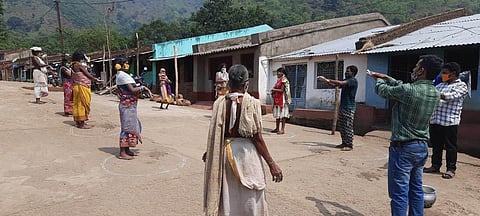

MALKANGIRI/RAYAGADA/BHUBANESWAR: The Bondas and Dongria Kondhs -- both particularly vulnerable tribal groups (PVTGs) which are currently in the grip of COVID-19 -- saw two new infections in the last 24 hours. The new cases have been detected in Mudulipada panchayat of Malkangiri and Bissamcuttack block of Rayagada. All the infected tribals are under home isolation.
The number of active cases among the Bondas – who reside on the top of Bonda hills under Khairiput block of Malkangiri – is eight. Similarly, there are five active cases among the Dongria Kondhs who live in Kalyansinghpur block and Bissamcuttack of Rayagada district.
While the Bondas are suspected to have contracted the disease from 15 Andhra Pradesh (AP) labourers who are currently engaged in manual stone crushing and construction of a new road to AP through Andrahal-Onkadaili (Koraput) route at Badebel village in Andrahal panchayat, the Dongrias might have got the infection after venturing out to the urban markets, officials suspect.
The Bondas who caught the virus include two children (one 12-year-old and another 5-year-old), a 28-year-old pregnant woman and the rest in the age group of 24-30. While six of the cases belong to Badbel and Realegada villages, both under Andrahal panchayat, another is from Mudulipada panchayat. According to reports, 11 Bonda tribals contracted the disease in the last fortnight of which four have recovered. AYUSH physician Debabrata Barik who is now treating the patients said the first infection among the Bondas was reported on April 26.
"It is suspected that the infected tribal had come in contact with AP labourers who were not being tested for COVID-19 despite travelling to the neighbouring state frequently," said the doctor. Subsequently, a child in the AP labourers' group complained of fever and when tested, she was found positive on May 3. A few days later, when some villagers of Andrahal panchayat started showing symptoms, the ASHA and anganwadi workers brought them to Khairiput CHC for COVID tests and five of them were found positive. On Thursday, a random rapid antigen test of 200 Bondas was conducted at the hill top villages and six were found positive.
What comes as a matter of concern is the lack of vigilance on the part of the Malkangiri administration which has no knowledge about the ongoing work by AP labourers. Apparently, the stone crushing and road construction work is being implemented by the Rural Development department through a contractor of Jeypore who brought the labourers, sources said. The labourers, who are occasionally
returning to their homes in AP and coming back, have been staying in the Andrahal panchayat office.
While CDMO Prafulla Nanda said contact tracing has been initiated in the Bonda Hills, sources in the JE (RD department) office said work on the road was stopped two days back following detection of the cases. Around 400 Bonda tribals of the two panchayats were administered the first dose of the COVID-19 vaccine two months back.
With the infection spreading, the road from Andrahal in Onkadali which connects Andhra Pradesh is being closed today to prevent people’s movement to the AP weekly market on this route, said CDMO Nanda. Contact tracing in Badbel area will be also done today, he added.
Meanwhile, Khairput tehsil officials rushed to Badbel village and put containment measures in place though Collector Yedulla Vijay had issued orders on Friday declaring Badbel village a containment zone from 5 pm.
As far as the Dongria Kondhs are concerned, during a regular health check-up at Parasali panchayat of Kalyansinghpur block on Thursday, four tribals had tested positive and one person of the community at Bissamcuttack was found infected in the last 24 hours.
Sudarshan Padhi, project manager, Dongria Kondh Development Agency (DKDA) informed that a mobile health team conducted COVID tests on 10 persons at Gandili village under Bissamcuttack block on Friday and one was found positive.
Rayagada's Niyamgiri Hills is home to 2,461 Dongria Kondh families comprising 9,597 tribals who are spread across 102 villages under Bissamcuttack, Kalyansinghpur and Muniguda blocks.
The officer informed that the Dongrias might have been infected after visiting markets in the urban areas. "Since the Dongrias live in close proximity, it is difficult to prevent COVID spread but we are taking utmost precautions," Padhi said.
Apparently, unlike other states where special drives are being held to vaccinate the vulnerable tribal population, such measures are yet to start in Odisha. Although awareness drives are being conducted among tribals groups on COVID-appropriate behaviour, vaccination of the tribal population remains very limited since they have zero digital literacy and no access to the portals. The department, currently, has no information on the number of tribals who have taken the jabs.
Higher officials of the SC & ST Development department admitted that they are mostly dependent on NGOs and community resource persons associated with the department to facilitate vaccination of the tribals.
"So far, the COVID prevalence has been mostly limited to urban areas and tribal pockets were untouched. We have a strong network of NGOs and community resource persons who are conducting door to door surveys in PVTG areas at regular intervals as a result of which, we are able to detect the new infections and isolate them immediately," said department Commissioner Ranjana Chopra.
She added that a department study after the first wave has shown that the tribals remained unaffected from the virus last year because of their own social distancing practices. "But with the detection of the new cases, we have now decided to put a system in place for vaccination of the tribals", she added. Interestingly, both the PVTGs had remained unaffected by the virus in the first wave.